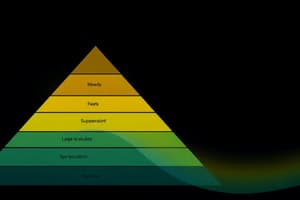Podcast
Questions and Answers
What does the term 'psychology' stem from?
What does the term 'psychology' stem from?
- The study of the brain
- The study of human behavior and mental processes (correct)
- The study of social interactions
- The study of animals and their behavior
Who is considered the Father of Modern Psychology?
Who is considered the Father of Modern Psychology?
- Wilhelm Wundt (correct)
- Sigmund Freud
- Wilhelm James
- Carl Rogers
According to William James, what does the 'I' represent in the Theory of Self?
According to William James, what does the 'I' represent in the Theory of Self?
- The physical attributes of a person
- The social roles that one plays
- The aspect that organizes and interprets experiences (correct)
- The part of self that is perceived by others
What element of self is referred to as the 'Material Self'?
What element of self is referred to as the 'Material Self'?
What does the 'Social Self' encompass?
What does the 'Social Self' encompass?
What did Sigmund Freud identify as a primary motivator of human behavior?
What did Sigmund Freud identify as a primary motivator of human behavior?
Which of the following represents the 'Pure Ego' according to William James?
Which of the following represents the 'Pure Ego' according to William James?
How does Freud define a healthy individual in terms of personality structures?
How does Freud define a healthy individual in terms of personality structures?
What is the primary focus of the ID in personality theory?
What is the primary focus of the ID in personality theory?
Which stage of psychosexual development involves the conflict of toilet training?
Which stage of psychosexual development involves the conflict of toilet training?
At what age does the Latent Stage of psychosexual development occur?
At what age does the Latent Stage of psychosexual development occur?
What is a fixation associated with the Oral Stage?
What is a fixation associated with the Oral Stage?
Which of the following describes Erikson's first stage of psychosocial development?
Which of the following describes Erikson's first stage of psychosocial development?
What psychological conflict is associated with the Phallic Stage of psychosexual development?
What psychological conflict is associated with the Phallic Stage of psychosexual development?
What principle does the Superego primarily represent in personality structure?
What principle does the Superego primarily represent in personality structure?
Which age range corresponds with Erikson's stage of 'autonomy vs shame and doubt'?
Which age range corresponds with Erikson's stage of 'autonomy vs shame and doubt'?
Flashcards are hidden until you start studying
Study Notes
Psychology Overview
- Derived from Latin roots "psyche" meaning soul and "logos" meaning study; defined as the study of human behavior and mental processes.
- Modern Psychology emerged in 1879 with Wilhelm Wundt establishing the first experimental laboratory in Leipzig, Germany, marking it as a scientific discipline.
- Focuses on interactions between body and mind, considering both physical and mental aspects of human experience.
Wilhelm James and Self-Concept
- An American philosopher and psychologist recognized for his Theory of Self.
- Distinguishes between two aspects of self:
- I: Subjective, active perceiver; responsible for organizing and interpreting experiences.
- Me: Objective; the perceived part of self, subject to others' perceptions.
Four Elements of Self (Me)
- Material Self: Encompasses the physical attributes and possessions; includes body features and personal belongings.
- Social Self: Attributes ascribed by others; varies based on social interactions.
- Spiritual Self: Internal thoughts and values; subjective elements reflecting personality and conscience.
- Pure Ego: Connects past, present, and future self; acts like continuity of mind.
Sigmund Freud and Psychoanalysis
- Considered the Father of Psychoanalysis, posited that unconscious drives govern behavior.
- Defined personality structure with an emphasis on rationality:
- ID: Impulsive, pleasure-driven; operates on the pleasure principle.
- Superego: Moral aspect of personality; enforces ethical behavior.
- Ego: Mediates between ID and Superego; operates on reality principle.
Psychosexual Development Stages
- Oral Stage (0-1 year): Focus on mouth; potential fixation leads to thumb sucking or drinking.
- Anal Stage (2-3 years): Focus on bowel control; conflicts with toilet training; fixation can lead to anal-retentive or anal-expulsive behaviors.
- Phallic Stage (3-5 years): Focus on genitals; leads to Oedipus and Electra complexes; fixation relates to dependency and gender identity confusion.
- Latent Stage (6-12 years): Dormant sexual feelings; development of defense mechanisms; immaturity is possible but less common.
- Genital Stage (13+ years): Onset of puberty; focuses on sexual desires and mature relationships.
Defense Mechanisms
- Developed to cope with conflicts arising from psychosexual development; serve as psychological strategies to protect individual from anxiety.
Erik Erikson and Psychosocial Development
- Focuses on the influence of family and culture across eight stages of development, emphasizing critical psychosocial crises.
- Stages include:
- Infancy (Trust vs. Mistrust): Trust developed through parental care; fundamental to later relationships.
- Early Childhood (Autonomy vs. Shame and Doubt): Facilitates independence; autonomy encouraged through choices; inadequacy leads to shame.
- Preschool (Initiative vs. Guilt): Ability to initiate activities and assert control; guilt emerges if initiative is suppressed.
Studying That Suits You
Use AI to generate personalized quizzes and flashcards to suit your learning preferences.




